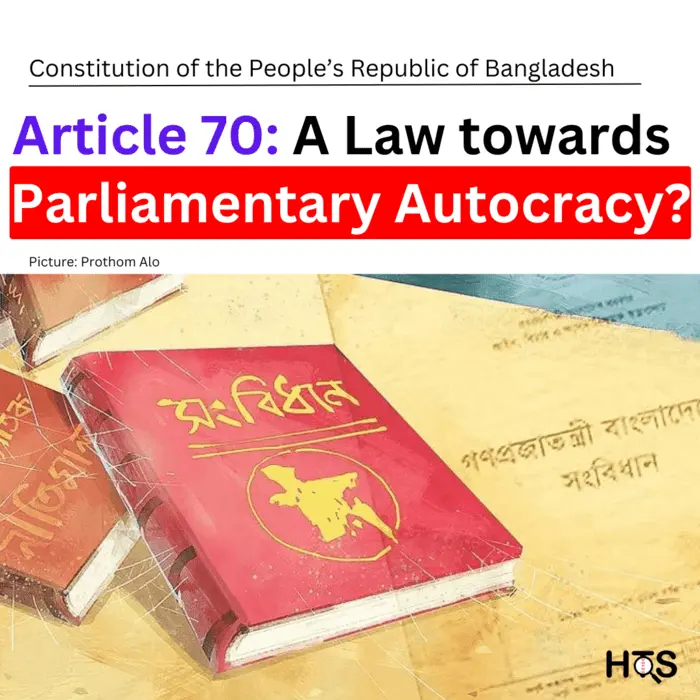Article 70: Law towards Parliamentary Autocracy?

Article 70 of the Bangladesh Constitution states that A person elected as a member of Parliament at an election at which he was nominated as a candidate by a political party shall vacate his seat if he –
(a) resigns from that party ; or (b) votes in Parliament against that party, but shall not thereby be disqualified for subsequent election as a member of Parliament.
While talking about the powers of the PM and how to limit their power and how to ensure a parliament with diverse opinions, the topic of repealing Article 70 has often been brought up. It binds MPs to their parties more than their constituents and is often used as an argument. Since the formation of Bangladesh as a republic, never has a vote of no confidence also been passed or made in the parliament, as the current constitution makes the whole process hard to achieve.
The reason this was introduced has a deep historical context. The ruling party, the Awami League, in the 70s wanted the parliament to have legislative powers; however, they had trauma regarding the chaotic period of the United Front, which eventually led to martial law in Pakistan. To prevent a similar outcome and to keep the party in line along with the central leadership being strong and to prevent factions within the party. While it had some noble intentions, it was soon exploited several times in Bangladeshi history.
This article was enacted through President Order No. 73, which was issued on March 13, 1972.
It did face a lot of criticism when it was eventually passed. Opposition MP Suranjit Sengupta of the National Awami Party criticized the act, calling it undemocratic.
Afterwards Article 70 was added to the original constitution and later on was more detailed in the fourth amendment of the constitution, which stated,
1) If a MP misses a vote in the parliament, the vote is counted against, and hence he is out.” 2) If an MP does not attend any meeting in the parliament, his vote is counted against.
Article 70 isn’t only common in Bangladesh, but similar laws exist in Pakistan (which no longer functions as a healthy democracy) and India (still a functioning democracy), which passed an anti-defection bill in 1985.
However, there are ways to navigate around Article 70.
While a vote of no confidence is hard in the 12th Amendment, a process was added on how to remove a party leader.
Another way MP’s tried to navigate this is by defecting to another party. In 1996, two BNP MP’s defected to the AL mid-parliament; however, BNP protested this, stating Article 70 prevents this, as they went against their party and thus legally resigned from parliament. However, the attorney general at that time did not agree to this meaning. Later on, this was argued in court, and the court agreed to BNP’s meaning, thus making interparliamentary party changes impossible.
Another loophole around Article 70 is the fact that if a candidate wins an election with one party but before parliament starts to convene switches to another party, he is counted as a MP of that other party. This was the clause in the constitution before the 15th Amendment. Nowadays, it is ambigious.
Why Do Both Parties Want to Keep Article 70?
To understand this, we need to look at the results of each parliamentary election in Bangladesh from 1991 to 2008:
| Year | BNP | AL | Coalition |
|---|---|---|---|
| 1991 | 140 | 88 | 158 |
| 1996 | 116 | 146 | 178 |
| 2001 | 193 | 62 | 214 |
| 2008 | 30 | 230 | 263 |
In the 1990s elections, we can see a pattern that both parties needed to form coalitions in order to form governments; as a result, MP switching or being against the party within the government would already weaken the government’s power.
In the 2000s, both parties won with large majorities, Article 70 helped these coalition governments pass amendments to the constitution and gave them power beyond reach.
The power of Article 70 helped the Awami League maintain complete control over the parliament from 2008-2024. Since no MP could vote against the party, amendments and bills were passed with sheer majorities with no opposition. Thus there is a precedent for Article 70 causing autocratic rule and destabilizing democracy.
Sources
- Representation without Participation: Quotas for Women in Bangladesh
- Bangladesh Election Results 1991-2001
-
[Bangladesh Ninth National Parliament Election ANFREL](https://aceproject.org/ero-en/regions/asia/BD/bangladesh-final-report-general-elections-anfrel/at_download/file) - Khondker Delwar Hossain Vs. The Speaker, Bangladesh Jatiyo Shangshad
-
[Inconclusive debate on Article 70 The Daily Star](https://www.thedailystar.net/backpage/news/inconclusive-debate-article-70-1987825)

